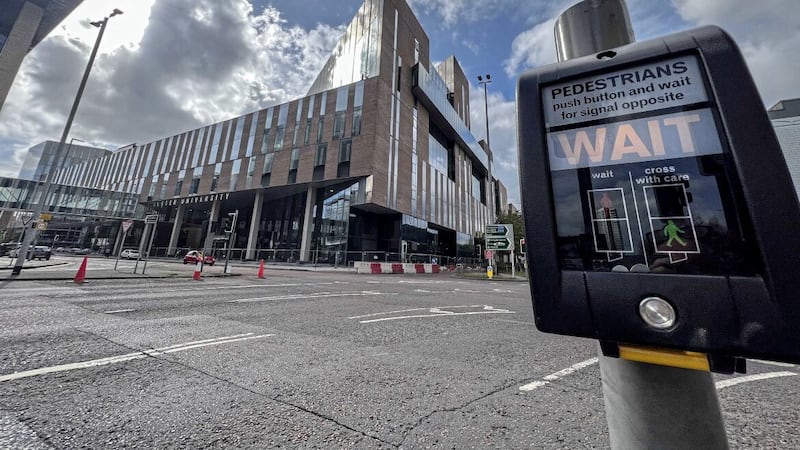Northern Ireland’s 11 super-councils, with their supposedly enhanced powers, still have no power over the roads or anything beside or on the roads. Even in town centres, everything except sweeping footpaths is the preserve of Stormont’s Department for Infrastructure (DfI).
This is a bizarre contrast with most of the world. In Britain, councils have complete authority over all roads other than trunk routes and motorways. Their responsibilities include street lighting, signs, signals, maintenance, drainage, safety and regulating roadworks by others. Councils enforce parking and this year, in England, acquired police traffic powers. They also play an important role in planning and operating public transport.
Pedestrian crossings provide an illustration of the difference this all makes.
Most councils in Britain have a simple online application process for residents or groups who want a new crossing. Applications are judged against criteria set by the Department for Transport in Whitehall, such as average traffic speeds or nearby schools, but it is up to councils to make the assessment and to fund, prioritise and undertake any work. As an example, York City Council says a decision typically takes four months and installation a further two.
In Northern Ireland, a resident or group who wants a crossing may appeal to their councillors or MLAs, who may in turn appeal to DfI. This is not a formal process and what happens next is anyone’s guess, although nothing is usually a good guess.
In June, construction finally began on a crossing in south Belfast that had taken three years of campaigning to get approved, followed by another year to see if funding would be available. This achievement was considered so extraordinary that councillors from the SDLP, Greens, Alliance and Sinn Féin fought to claim credit for it. DfI’s minister after devolution returned in 2020 was the SDLP’s Nichola Mallon, which might have helped nudge the work along.
But consider how absurd it is, even in a place as small as Northern Ireland, for a minister to have to intervene to get a zebra crossing painted, or for a government department to be holding the paint brush in the first place. This is the definition of what councils should be doing. The doctrine of subsidiarity - of making decisions as locally as possible - is not just about efficiency. Giving people control over their immediate environment is essential to the well-being of individuals, communities and democracy. DfI squats over much of what feels dirty and dysfunctional in our surroundings, exacerbating a public sense of helplessness at not being able to do anything about it.
These frustrations lay behind a Green Party motion at Belfast City Council last week to devolve road and transport powers from Stormont to councils. Although the motion was backed by the SDLP, Alliance and smaller parties it was solo-run grandstanding, perhaps most kindly described as aiming to start a debate.
Sinn Féin, the DUP and the UUP blocked the motion, giving candid explanations. Councils will always have to work closely with DfI so the focus should be on fixing “the systemic difficulties in Stormont departments”, as Sinn Féin put it, or their “abysmal response times”, as the DUP put it more bluntly.
One DUP councillor noted planning powers have been partially devolved to councils, which was meant to be “a panacea”, yet “we still have the same challenges now”.
While these were mature reflections, how much longer will councillors stroke their chins while DfI sits on its hands?
The Greens cited pedestrianisation as something councils cannot do and DfI refuses to do, as shown by broken promises made during the pandemic. The opening of Ulster University’s Belfast campus this month should further concentrate minds: 15,500 people will suddenly be living and working either side of an unaltered eight-lane inner ring road.
Devolution of some road and transport powers was considered during the creation of the supercouncils a decade ago. In Belfast’s case, this would have involved transferring around 200 staff plus a share of the budget from Stormont. Political parties had no fundamental objection, nor had most staff - their employment terms would have been protected. Resistance came mainly from civil service management, which did not want to lose any of its empire. That would be an illegitimate reason to obstruct change even if the empire were working.
Achieving a better spread of powers between DfI and the councils would be a big task but the amount of little things it would improve makes it an idea all parties must keep on the agenda.









